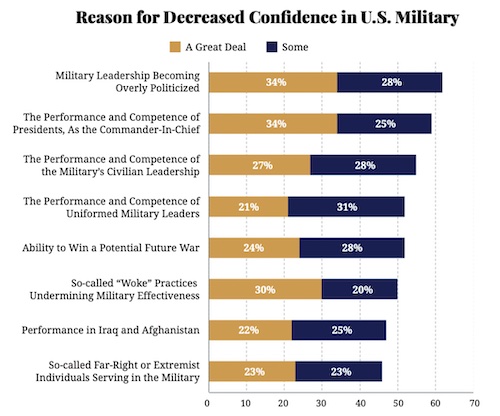 |
Less than half (48 percent) of Americans have a great deal of confidence in the US military, according to a poll released Dec. 1 by the Ronald Reagan Presidential Foundation.
That’s down from 70 percent in 2018 but up a bit from the 45 percent recording in last year’s Reagan National Defense Survey.
A perceived politicization of the military, cited by 62 percent of respondents, is the top reason for the loss of confidence in the military.
Poor civilian leadership (55 percent), ability to win a potential future war (52 percent), “woke practices” undermining military effectiveness (50 percent) and existence of far right or extremist individuals serving in the military (46 percent) are among other reasons.
 |
The Foundation found that 57 percent of Americans want to continue supplying military assistance to Ukraine.
Russia is viewed as an enemy by 82 percent of respondents, which is up from 65 percent a year ago.
China poses the greatest threat to the US, according to a 43 percent plurality.
Three-quarters of respondents said they see China as an enemy. That's up from 65 percent and 55 percent in the 2021 and 2018 polls.
More than half (54 percent) say the US lacks a clear strategy for managing its relationship with China.
Seventy percent believe China is going to invade Taiwan during the next five years.
If so, 43 percent would support committing US ground troops to the defense of Taiwan and 36 percent would oppose.
What Me Worry? Goldman Sachs doesn’t think the rounds of layoffs at Big Tech are signals of an impending recession.
Though high-profile cutbacks at Twitter and Meta earn plenty of coverage, GS researchers point out the tech sector is only a tiny portion of the nation’s employment.
The investment bank says the real reason Big Tech is cutting staff is because it got too big for its britches.
Revenue growth is “normalizing” after the pandemic increased demand for tech products and services.
Goldman also says higher interest rates and tighter financial conditions “disproportionately impact the sector because tech company profits are typically expected further out in the future and therefore are subject to greater duration risk.”
The layoffs are necessary to “rebalance” the tech sector. Those are empty words for somebody who just lost her job.
Goldman in September was the first major Wall Street bank to cut staff due to the collapse of the deal market. On December 2, it warned traders and salespeople that the bonus pool would be 10 percent smaller this year.


 Republican tough guys Josh Hawley and Tom Cotton want Biden to send the National Guard to Columbia University to put an end to student protests... Bernie blasts Bibi for insulting America's intelligence by equating criticism of Israel's government with antisemitism... German court convicts former financial PR exec who claims he wasn't aware that trading on tips is illegal.
Republican tough guys Josh Hawley and Tom Cotton want Biden to send the National Guard to Columbia University to put an end to student protests... Bernie blasts Bibi for insulting America's intelligence by equating criticism of Israel's government with antisemitism... German court convicts former financial PR exec who claims he wasn't aware that trading on tips is illegal.  Southern governors claim they know what's best for their working class, and it's not pay raises... A Ukrainian human rights group played a key role in convincing House Speaker Mike Johnson to hold a vote to send arms to Ukraine, Israel and Taiwan... Trump Media & Technology Group blames short-selling and not lousy outlook for its stock slump.
Southern governors claim they know what's best for their working class, and it's not pay raises... A Ukrainian human rights group played a key role in convincing House Speaker Mike Johnson to hold a vote to send arms to Ukraine, Israel and Taiwan... Trump Media & Technology Group blames short-selling and not lousy outlook for its stock slump. The techniques deployed by OJ Simpson's defense team in the 'trial of the century' served as a harbinger for those used by Donald Trump... People worry about the politicization of medical science just as much as they fret about another pandemic, according to Edelman Trust Barometer... Book bans aren't restricted to red states as deep blue Illinois, Connecticut and Maryland challenged at least 100 titles in 2023.
The techniques deployed by OJ Simpson's defense team in the 'trial of the century' served as a harbinger for those used by Donald Trump... People worry about the politicization of medical science just as much as they fret about another pandemic, according to Edelman Trust Barometer... Book bans aren't restricted to red states as deep blue Illinois, Connecticut and Maryland challenged at least 100 titles in 2023. The NBA, which promotes legalized gambling 24/7, seems more than hypocritical for banning player for placing bets... Diocese of Brooklyn promises to issue press release the next time one of its priests is charged with sexual abuse... Truth Social aspires to be one of Donald Trump's iconic American brands, just like Trump University or Trump Steaks or Trump Ice Cubes.
The NBA, which promotes legalized gambling 24/7, seems more than hypocritical for banning player for placing bets... Diocese of Brooklyn promises to issue press release the next time one of its priests is charged with sexual abuse... Truth Social aspires to be one of Donald Trump's iconic American brands, just like Trump University or Trump Steaks or Trump Ice Cubes. Publicis Groupe CEO Arthur Sadoun puts competition on notice... Macy's throws in the towel as it appoints two directors nominated by its unwanted suitor... The Profile in Wimpery Award goes to the Ford Presidential Foundation for stiffing American hero and former Wyoming Congresswoman Liz Cheney.
Publicis Groupe CEO Arthur Sadoun puts competition on notice... Macy's throws in the towel as it appoints two directors nominated by its unwanted suitor... The Profile in Wimpery Award goes to the Ford Presidential Foundation for stiffing American hero and former Wyoming Congresswoman Liz Cheney.


 Have a comment? Send it to
Have a comment? Send it to 
Dec. 6, 2022, by Bill Huey
Another major American institution Trump has undermined with his "My Generals" nonsense and dictator-like maneuverings.
The damage from the Trump years is still corroding America.